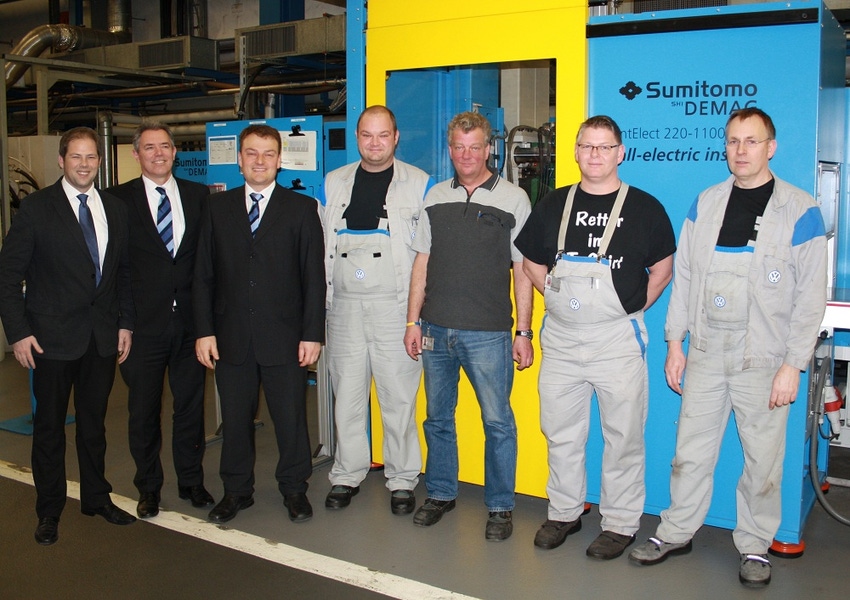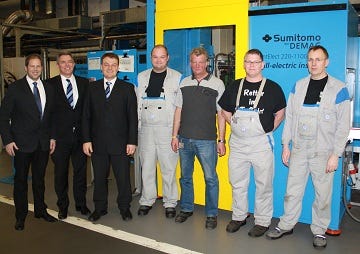Recently, Volkswagen AG took delivery of its first fully electric IntElect 220-1100 machine from Sumitomo (SHI) Demag GmbH (Schwaig, Germany). The machine produces lighting dial trims for the Golf VII. The IntElect machine reportedly offers shorter cycle times and minimum scrap generation in manufacturing precision components in addition to impressive energy savings.
February 13, 2013

Recently, Volkswagen AG took delivery of its first fully electric IntElect 220-1100 machine from Sumitomo (SHI) Demag GmbH (Schwaig, Germany). The machine produces lighting dial trims for the Golf VII. The IntElect machine reportedly offers shorter cycle times and minimum scrap generation in manufacturing precision components in addition to impressive energy savings.
Using the IntElect increases the energy efficiency and the repeat accuracy in manufacturing precision parts (above); Volkswagen and Sumitomo (SHI) Demag staff front up to the energy saving challenge (below). |
|
Compared to hydraulic machines, the direct electric drives in the plasticizing and injection steps boast low energy consumption, while electric mold opening and closing also brings saving. In addition, the braking energy from each main axis is temporarily stored in order to provide energy for the other axes. In this way, IntElect machines save up to 85% of the energy compared to conventional solutions. Direct drives convert less energy into heat than hydraulic drives do, so they also require less cooling power than comparable conventional machines.
"In our production processes along the value creation chain, energy efficiency is playing an increasingly important role. The fully electric IntElect machine from Sumitomo (SHI) Demag makes an important contribution to this," explains Marco Heinemann who is responsible for project management of new start-ups in the Braunschweig plant. Jens Pedersen, a VW employee in the works technology department, adds: "By using the IntElect, we have been able to improve the cycle time by 15% compared to a hydraulic machine. At the same time, we are able to reduce scrap because of the increased precision and repeat accuracy." Karsten Goebel, another employee in the works technology department in Braunschweig, adds that the enormously smooth running of the machine is remarkable compared to a hydraulic machine.
The Braunschweig plant is one of the most important system suppliers for the vehicles of the Volkswagen Group. Parts from the Braunschweig plant are installed in almost all VW vehicles, and include front axles, rear axles, steering systems, axle modules, shock absorbers/pedals as well as an extensive assortment of plastic components. 60 tonnes of granules are delivered every day to the plastics technology area at Braunschweig, where they are processed into 500 different products, such as for the vehicle interior, on 132 injection molding machines with 447 injection tools and two painting systems.
The Volkswagen brand has set clear targets for putting all its factories on a sustainable ecological footing with the "Think Blue. Factory" concept: By 2018, all Volkswagen plants are supposed to have reduced their energy and water consumption as well as the waste volumes and emissions by 25 percent. To achieve these ambitions targets, VW will continue to invest in fully electric injection molding machines in the future.
About the Author(s)
You May Also Like



